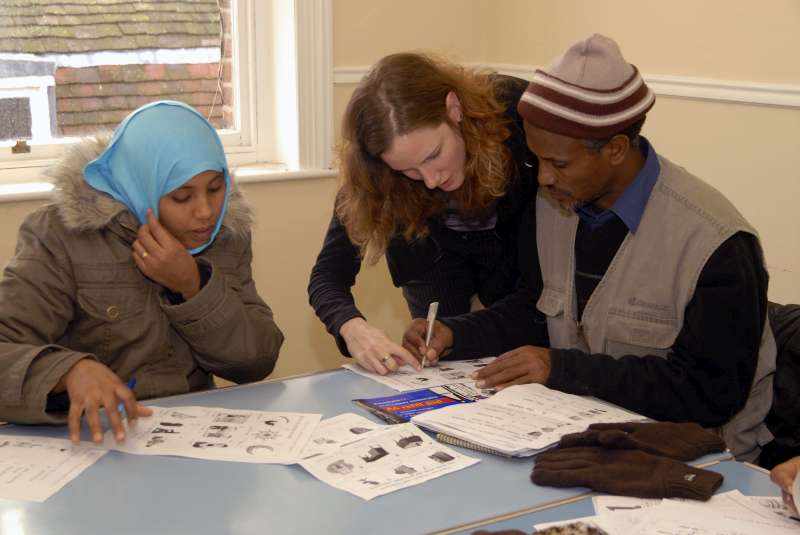Asylum in the UK
What is an asylum seeker?
An asylum seeker is someone who has applied for asylum and is waiting for a decision as to whether or not they are a refugee. In other words, in the UK an asylum seeker is someone who has asked the Government for refugee status and is waiting to hear the outcome of their application.
Does the UK have more asylum seekers than most countries?
No it does not. In 2017, the UK received 26,350 applications from main applicants, a 14% decrease from the previous year. This is considerably less than the number of applications received in many other countries, and makes the UK fifth out of the EU's 28 member states in terms of asylum applications. In the year ending March 2018 Germany received the highest number of applications (179,000), followed by Italy (121,400), and France (102,900). World-wide around 84% of all refugees live in developing countries, not in wealthy industrialised countries.
(Source: Immigration statistics, year ending March 2018)
How many refugees are there in the UK?
According to UNHCR statistics at the end of 2016 there were 118,995 refugees, 46,784 pending asylum cases and 64 stateless persons in the UK.
The vast majority of refugees stay in their region of displacement, and consequently are hosted by developing countries. Turkey now hosts the highest number of refugees with 1.84 million, followed by Pakistan with 1.5 million. Half of the top-ten refugee-hosting countries in the world are located in Sub-Saharan Africa.
(Source: UNHCR 2016 Global Trends Report)
Where do asylum seekers in the UK come from?
In the year ending March 2018, the largest number of asylum applications came from nationals of: Iran (2,482), followed by Pakistan (2,401), Iraq (2,391), Sudan (1,754), and Bangladesh (1,542).
(Source: Immigration statistics, year ending March 2018)
What is a bogus asylum seeker?
There is no such thing as a bogus asylum seeker or an illegal asylum seeker. As an asylum seeker, a person has entered into a legal process of refugee status determination. Everybody has a right to seek asylum in another country. People who don't qualify for protection as refugees will not receive refugee status and may be deported, but just because someone doesn't receive refugee status doesn't mean they are a bogus asylum seeker.
Let us remember that a bogus asylum-seeker is not equivalent to a criminal; and that an unsuccessful asylum application is not equivalent to a bogus one - Kofi Annan
What benefits do asylum seekers receive in the UK?
The majority of asylum seekers do not have the right to work in the United Kingdom and so must rely on state support.
Housing is provided, but asylum seekers cannot choose where it is, and it is often ‘hard to let’ properties which Council tenants do not want to live in.
Cash support is available, and is currently set at £36.95 per person, per week, which makes it £5.28 a day for food, sanitation and clothing.
(Source: Home Office)
How many refugees have been resettled to the UK?
Resettlement is the transfer of refugees from a country where they have initially sought asylum - often in the same region as their country of origin - to a third state which has agreed to admit them. It is a life-changing durable solution for refugees whose life, liberty, health, or human rights are at risk in their country of refuge, or for whom relocating to another country is their only hope of being reunited with their family.
Refugees can be resettled to the UK via the Gateway Protection Programme and the Mandate Scheme or the Syrian Vulnerable Person's Resettlement Scheme (VPRS).
In the year ending March 2018, 5,760 people were resettled in the UK, including 4,342 under the VPRS, 632 under the Vulnerable Children Resettlement Scheme, 768 under the Gateway Programme and 18 people under the Mandate Scheme.
Find out more about resettlement here.
(Source: Immigration statistics, year ending March 2018)
What is subsidiary or humanitarian protection?
Subsidiary protection can be given to people who do not meet the 1951 Convention’s legal definition of a refugee but are still in need of international protection.
Across the EU, the Qualification Directive provides subsidiary protection for those facing the following threats if returned to their country: (1) the death penalty or execution; (2) torture, inhuman or degrading treatment or punishment; or (3) threats from an international or internal armed conflict.
The UK uses the legal term humanitarian protection to meet this Directive. Applicants can also be given 'discretionary leave to remain', a form of temporary permission which is unlikely to be more than three years.

